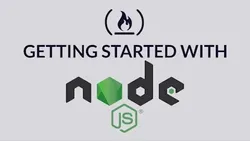
Getting Started with Nodejs - Full Tutorial 
This tutorial provides an introduction to Node.js, covering the basics of the runtime and how to write JavaScript code for it. Get started with Node.js today and become comfortable with its fundamentals. ▼
ADVERTISEMENT
Course Feature
![]() Cost:
Cost:
Free
![]() Provider:
Provider:
freeCodeCamp
![]() Certificate:
Certificate:
Paid Certification
![]() Language:
Language:
English
![]() Start Date:
Start Date:
On-Demand
Course Overview
❗The content presented here is sourced directly from freeCodeCamp platform. For comprehensive course details, including enrollment information, simply click on the 'Go to class' link on our website.
Updated in [March 06th, 2023]
Node.js is a popular JavaScript runtime that allows developers to create powerful web applications. This full tutorial will help you get started with Node.js and understand the basics of the language. You will learn how to write JavaScript code for Node.js, how to use the Node.js framework, and how to create powerful web applications. You will also learn about the different development paths available for Node.js and how to use them to create powerful applications. Additionally, you will get suggestions for related learning materials to help you further your Node.js development. With this tutorial, you will be able to get started with Node.js and become a proficient Node.js developer.
[Applications]
After completing this course, students can apply their knowledge of Node.js to create web applications, build APIs, and create command-line tools. They can also use Node.js to create real-time applications, such as chat applications, and to create server-side applications that interact with databases. Additionally, students can use Node.js to create applications that can be deployed to the cloud.
[Career Paths]
1. Node.js Developer: Node.js developers are responsible for developing and maintaining web applications using Node.js. They must have a strong understanding of JavaScript and be able to write efficient code. Node.js developers must also be familiar with the latest web technologies and trends. As Node.js continues to grow in popularity, the demand for Node.js developers is expected to increase.
2. Full Stack Developer: Full stack developers are responsible for developing both the front-end and back-end of web applications. They must have a strong understanding of both client-side and server-side technologies. Full stack developers must also be familiar with the latest web technologies and trends. As web applications become more complex, the demand for full stack developers is expected to increase.
3. Web Application Architect: Web application architects are responsible for designing and developing web applications. They must have a strong understanding of web technologies and be able to design efficient and scalable applications. Web application architects must also be familiar with the latest web technologies and trends. As web applications become more complex, the demand for web application architects is expected to increase.
4. DevOps Engineer: DevOps engineers are responsible for automating the deployment and management of web applications. They must have a strong understanding of web technologies and be able to write scripts to automate tasks. DevOps engineers must also be familiar with the latest web technologies and trends. As web applications become more complex, the demand for DevOps engineers is expected to increase.
[Education Paths]
1. Bachelor of Science in Computer Science: This degree path provides students with a comprehensive understanding of computer science fundamentals, including programming languages, algorithms, data structures, operating systems, and software engineering. Students will also learn about the latest trends in computer science, such as artificial intelligence, machine learning, and cloud computing.
2. Bachelor of Science in Software Engineering: This degree path focuses on the design, development, and maintenance of software systems. Students will learn about software development processes, software architecture, software testing, and software project management. They will also gain experience in developing software applications for various platforms.
3. Master of Science in Computer Science: This degree path provides students with an advanced understanding of computer science topics, such as computer networks, distributed systems, databases, and software engineering. Students will also learn about the latest trends in computer science, such as artificial intelligence, machine learning, and cloud computing.
4. Master of Science in Software Engineering: This degree path focuses on the design, development, and maintenance of software systems. Students will learn about software development processes, software architecture, software testing, and software project management. They will also gain experience in developing software applications for various platforms.
Course Provider

Provider freeCodeCamp's Stats at AZClass
Discussion and Reviews
0.0 (Based on 0 reviews)
Explore Similar Online Courses

Vibrant Lettering: Find Your Style Through Pop Culture

Cyber Security For Normal People: Protect Yourself Online

Python for Informatics: Exploring Information

Social Network Analysis

Introduction to Systematic Review and Meta-Analysis

The Analytics Edge

DCO042 - Python For Informatics

Causal Diagrams: Draw Your Assumptions Before Your Conclusions

Whole genome sequencing of bacterial genomes - tools and applications

React Basics Course

JavaScript: Functions


Start your review of Getting Started with Nodejs - Full Tutorial